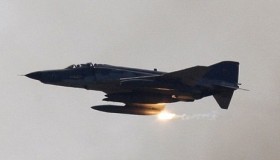Turkey’s cabinet was due to meet on Monday to discuss Friday’s incident, which lent a more threatening international dimension to the 16-month-old uprising against Assad. Britain called the attack over the eastern Mediterranean outrageous and said it stood ready to back strong action in the United Nations.
Turkish newspapers welcomed Prime Minister Tayyip Erdogan’s decision to invoke an article in the NATO alliance’s founding treaty providing for urgent consultations if a member considered its security interests threatened.
“Turkey has moved into action” both Milliyet and Vatan newspapers declared in headlines under the NATO flag.
Sabah newspaper columnist Mehmet Barlas said some were calling Friday’s attack a Syrian declaration of war. “We already know there is an ‘undeclared war’ being carried out between Turkey and Syria,” he said, citing the presence of the Syrian opposition and Syrian refugees sheltering on Turkish soil.
Fierce fighting continued inside Syria, which has a 900 km border with Turkey, with rebel fighters killing dozens of soldiers in the last few days as they fought against army attacks on towns and villages in central, north and eastern Syria in the last several days, according to opposition sources.
Syrian tanks and artillery shelled the eastern city of Deir al-Zor, killing at least 20 people in the second day of heavy bombardment in the country’s main oil-producing region, opposition activists said.
“Regime forces have dismantled their roadblocks from inside of Deir al-Zor after incurring heavy losses from rebels. They have withdrawn from residential areas and are now shelling the city from the outskirts. The victims are mostly civilians,” a source at a hospital in Deir al-Zor told Reuters.
The official state news agency said “terrorists” abducted a stateappointed head of clerics in Deir al-Zor and blew up an oil pipeline passing through the province.
The Syrian Network for Human Rights, an opposition activists’ organisation that monitors the crackdown on the 16-month revolt against Assad’s rule, said loyalist forces on Sunday killed another 70 people, mostly civilians and soldiers who had tried to defect, elsewhere in the country in shelling, military raids and summary executions in the provinces of Homs, Hama, Idlib, Deraa and suburbs of Damascus.
The intensification of the fighting has raised fears in Turkey of a flood of refugees and a slide into ethnic and religious warfare that could envelop the region.
Ankara, like the West, is torn between a wish to remove Assad and the fear that any armed intervention could unleash uncontrollable forces.
U.S. Secretary of State Hillary Clinton called the attack “brazen and unacceptable” and said Washington would cooperate closely with Ankara to promote a transition in Syria. Spanish government sources said European Union foreign ministers would also discuss the incident at a Luxembourg meeting on Monday.
While Turkish newspapers have railed against Assad, Erdogan, not always known for his emotional restraint, has eschewed bellicose rhetoric.
[adrotate banner=”52″]
 The Royal Mile is becoming increasingly dangerous
The Royal Mile is becoming increasingly dangerous Netanyahu’s Residence Targeted in Another Attack
Netanyahu’s Residence Targeted in Another Attack Russia Halts Gas Supplies to Austria, Marking a Shift in European Energy Relations
Russia Halts Gas Supplies to Austria, Marking a Shift in European Energy Relations Scholz speaks to Putin on the phone for the first time in two years
Scholz speaks to Putin on the phone for the first time in two years